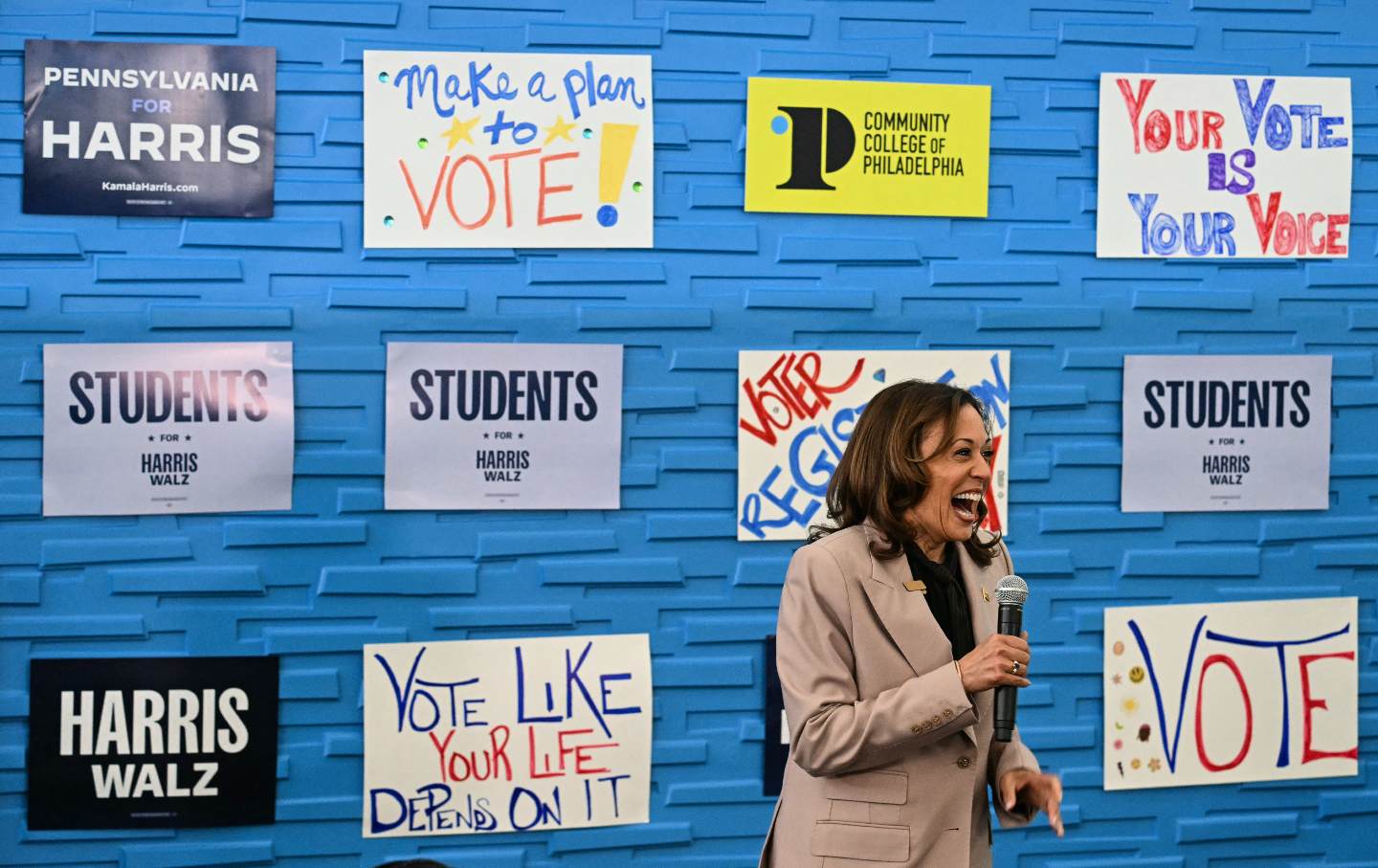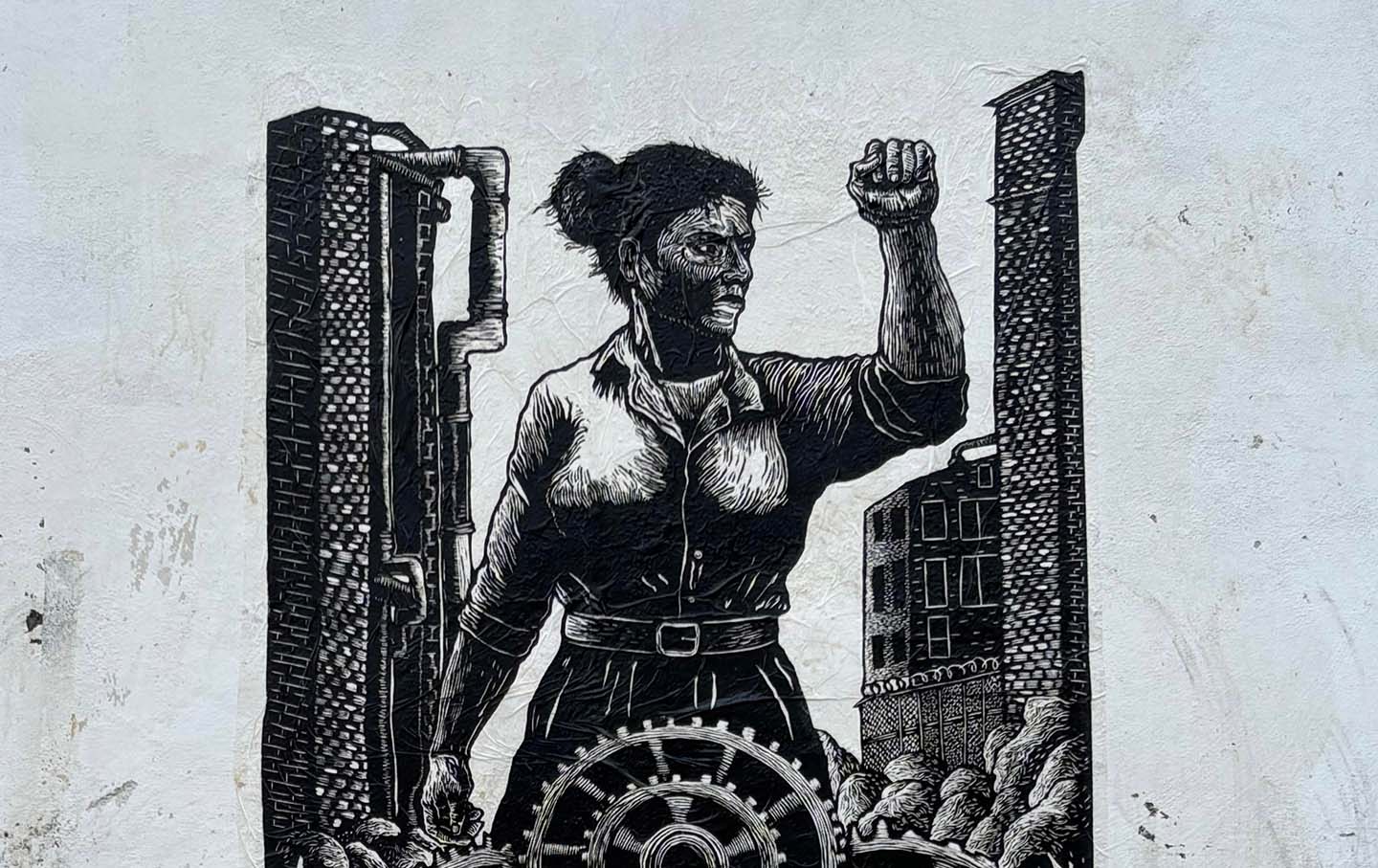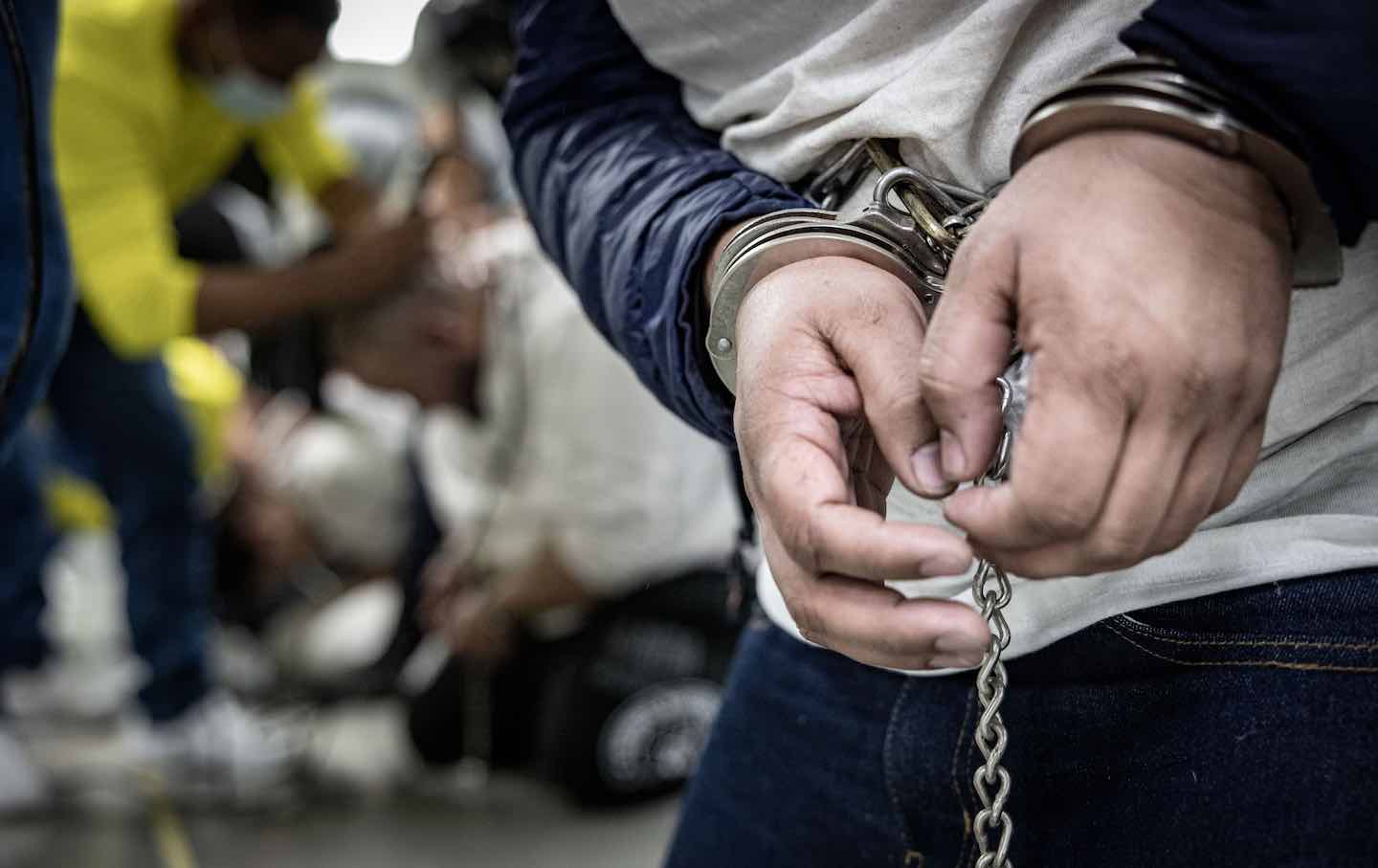How Kamala Harris Can Win More Young Voters
With fewer than 50 days left until the election, the Harris campaign faces the challenge of ensuring that its momentum among young people goes beyond memes.

(Jim Watson / Getty)
Darby Creegan, a rising junior at Swarthmore College in Pennsylvania, said she felt dread before Biden stepped down. While she would have supported him, she says, faced with the choice between Biden and Donald Trump, it wouldn’t have been an easy vote.
But with Kamala Harris as the official Democratic nominee (and Minnesota Governor Tim Walz as her running mate), she’s hopeful that Democrats now have a shot. “I hope that Kamala being younger will mean that her campaign will be a little bit readier to engage with Gen Z. For many of us, this is our first presidential election that we can vote in,” said Creegan, who works to register voters through the school organization SwatVotes. “I think having her on the ballot already is very galvanizing.”
The aftermath of Biden’s withdrawal and his immediate endorsement of Harris caused mayhem on social media platforms like X and TikTok. Jokes about coconut trees, and references to Charli XCX’s new album Brat filled the timeline. Even Harris’s official campaign team joined in.
But for Jessika Landon, the director of communications at the youth-led organization 18by Vote, it will take much more than trending social media memes to get Harris into the Oval Office. “I find that this momentum is often hard to keep,” Landon said. “Relatable marketing can become stale quickly, and can be seen as ‘cringe’ in almost the blink of an eye. As somebody who has been in the social media/marketing game for a long time, and as a civically engaged member of Gen Z, I think it will be tricky for candidates and organizations (including our own) to keep such high results until November. But I have hope.”
Youth voter turnout has been rising in the past decade but still remains low, according to data from Center for Information and Research on Civic Learning and Engagement (CIRCLE) at Tufts. In 2022, 23 percent of 18-to-29-year-olds voted in the midterm elections, up from 13 percent in the 2014 midterms. States with policies such as automatic or same-day registration, like Michigan, have higher turnout, highlighting the impact of vote registration initiatives and information sharing.
Daniel Perrin, a rising sophomore at Swarthmore, believes Harris has a more direct-to-voter campaign style that could excite young voters and center issues including abortion, unions, and gun control. He also sees more potential for Harris to participate in speeches, interviews, and debates, creating a bottom-up campaign that he hopes will lead to higher youth voter turnout. Her candidacy “allows the party to be less distracted by politics of Biden’s age and his mental capacity” and “stick to a message about the working-class policies that the party can put forward and also the danger that Trump poses for the country, democracy, environment and beyond,” Perrin said.
Voters of Tomorrow, a youth advocacy organization, saw a 700 percent spike in voter registration after Harris announced her candidacy. And following Taylor Swift’s endorsement of Harris after the debate on September 10, over 400,000 people visited the vote.gov website through the link Swift shared in just 24 hours.
Ethan Nichols, the 22-year-old deputy secretary of the Ohio Young Democrats, has hopes that a better foreign policy could engage younger voters: “I would personally love to see the VP spend more time focusing on a modern foreign policy vision that includes support for Ukraine and support for the people of Palestine,” as well as the Democratic Party pushing for more aggressive climate policies.
“The party platform and the nominee’s platform are more than just a list of policies. They are the moral values we stand by as a party and throughout governing,” Nichols said. “We must ensure that our platforms, and hence our values, are aligned with helping the most marginalized and vulnerable populations.”
A recent poll at the Institute of Politics at Harvard showed that over half of young voters said they plan to vote in the 2024 presidential election. As Harris’s campaign begins, these voters are watching to see how she engages on issues that matter to them—including abortion, the war on Gaza, climate change, gun violence control, and more—and will vote accordingly.
Perrin is optimistic that Democratic policies and things accomplished during Biden’s term are popular enough to win with the right candidate communicating them. He pointed to a speedy post-pandemic recovery, union support, expansions of social services, and infrastructure as past Biden successes that can now be run on without the baggage of his Israel record and age.
“Republicans are running on culture wars right now, and I think a common mistake Dems make is assuming that Trump is popular: He’s really not! Kamala’s being a competent communicator allows Dems to take advantage of this political environment that favors them—their policies being successful, more popular, and the right being very unpopular—in a way that Biden couldn’t because of his problems communicating, as well as because of the issues that were drowning his public image with important groups in the coalition that elected him the first time,” Perrin said.
But Harris’s own image as a prosecutor and attorney general was a liability for many young voters during the Democratic primary in 2020. With Harris as San Francisco first Black and South Asian district attorney, drug-dealing convictions rose to 74 percent. However, she also implemented education and employment rehabilitation programs for nonviolent offenders—such as low-level drug dealers. Her later career in the Senate partly dedicated itself to criminal justice reform, and she even introduced a bill of her own to decriminalize marijuana.
For William He, the 17-year-old founder and CEO of the pro-Democratic organization Dream for America, the rising high school senior believes that some of the criticisms of Harris are “overblown,” saying that the numbers of incarceration are “vastly overexaggerated.”
Popular
“swipe left below to view more authors”Swipe →Nichols, who has “been horrified by what’s happening in Gaza,” says that the Democratic Party needs “to do more to support Palestinian life.” Young voters broadly have expressed a strong desire for Harris to follow through and provide more than a tone shift in speeches after a dismissal of pro-Palestine protesters at a campaign rally in early August. Around half a million people submitted “uncommitted” ballots during the 2024 primary, largely led by younger voters in protest of Biden’s unconditional military support to Israel.
“I sympathize with the uncommitted delegates and I respect everyone who voted in the primary, regardless of who they voted for,” Nichols said. “I think now’s the time as a party not to alienate those individuals, and those people who chose to vote not have committed or those delegates.”
At the debate on September 10, Harris said she would continue to help Israel “defend itself,” suggesting there wouldn’t be a significant diversion from Biden’s policy with military weapons being sent.
Dahlia Saba, a PhD student at University of Wisconsin–Madison who worked with Students for Justice in Palestine, believes the Uncommitted Movement has made their demands for an arms embargo and permanent ceasefire clear and now is the time for action from Harris.
“Kamala Harris cannot just win an election based on appealing to the aesthetics of being younger and being more on-trend with the memes of the day,” Saba said. “That is not enough to win her the votes of Gen Z, who have seen on social media every day for the past 10 months the horrors being committed against Palestinians in Gaza. I think it is time for Kamala Harris to take a stronger stance, and it is completely within her power to do so and to call for an arms embargo.”
According to a poll in August conducted by the Institute for Middle Eastern Understanding, in Arizona, Georgia, and Pennsylvania, about 35 percent of Democratic voters would be more likely to vote with an arms embargo, compared to 5 percent being less likely to vote.
On September 19, the Uncommitted Movement announced that it will be withholding their presidential endorsement. Though they advocated for voters to be “anti-Trump,” the group expressed disappointment that Harris “fumbled” by refusing their request for a Palestinian-American speaker at the Democratic National Convention, and through the overall lack of campaign statements regarding weapons policy and “support of upholding US and international human rights law.”
“Kamala Harris and Biden’s administration’s refusal to comply with these popular demands shows that not only do they have no respect for Palestinian life and Palestinian dignity, but they also don’t really have respect for their own voters and for what is popular—especially among young people who won the 2020 election for Biden,” said Saba. “It’s a matter of basic principles, but it’s also, strategically, this is a popular issue, and calling for an arms embargo would help them win the election.”
The Democratic Youth Coalition, which endorsed Harris, is hosting town halls to highlight youth voices and raise awareness for issues including gun violence, climate change, and abortion access.“I think youth voters are increasingly engaged because they feel heard in this cycle,” said Rhea Iyer, founding executive director at DYC and a rising junior at Georgetown University in Washington, DC. “While there is still work to be done to elect progressive candidates at both the local and national levels, I’m proud of the progress we’ve made so far.”
Harris has cemented her desire to continue some of Biden’s work in forgiving student loan debt and lowering drug costs such as insulin, the latter of which she recently proposed capping at $35, and detailed her economic visions in a August rally that included lucrative proposals such as providing first-time home buyers a $25,000 subsidy, banning grocery price gouging and giving families with newborn children a $6,000 tax credit.
As vice president, Harris took a key role in advocating for reproductive rights, reportedly becoming the first vice president to visit an abortion clinic. As Harris campaigns, she has put abortion access at the forefront, and she has pledged to implement legal protections for abortion rights if elected. During the September 10 debate with Trump, Kamala condemned state abortion bans and said she would proudly sign the protections of Roe v. Wade into law if passed by Congress.
At her July 30 rally in Georgia, Harris invited Atlanta rapper Quavo to his hometown to take the stage and address gun violence in America, following the loss of his fellow Migos member and nephew, Takeoff, in 2022. At the debate, she also reminded voters that she and Governor Walz are gun owners themselves, after Trump claimed that she would “confiscate everybody’s gun.”
With housing affordability being a pressing topic among Gen-Z voters, 91 percent of whom cite it as their top voting issue, Harris has previously advocated for federal housing and homelessness reduction.
Cea Weaver, a tenant organizer for the coalition Housing Justice for All, says she hopes to see a candidate like Harris advocate for federal rent controls, commodified social housing (such as New York’s Co-Op City), and stop people from paying “50, 60, or 70 percent of their income in rent.” To Weaver, there’s only one person in the race who has a history of engaging with housing discrimination, of pushing anti-worker policies as a boss and evicting families.
“Donald Trump is a New York City landlord, first and foremost, and if he becomes president again, we know what will happen,” Weaver said. “Housing will become more unaffordable, especially for renters who’ve got a long history of discriminating as a landlord of price gouging his tenants….I think it’s just really important that whoever is running for president tackle the affordable housing crisis.”
While Biden was historically stronger than any of his predecessors in climate policy, he also made concessions to oil companies such as the Willow Project pipeline. Young climate activists are hoping to see bolder moves, including declaring climate change a national emergency which would open up federal powers.
Harris was an original cosponsor of the Green New Deal, and her 2020 presidential campaign advocated a carbon tax in order to reduce pollution and a ban on the pollutive oil-retrieval technique known as hydraulic fracking. However, she has also expressed continued support for fracking, reversing a previous declaration.
Adah Crandall became involved in climate organizing during seventh grade when she witnessed vehicle pollution from a highway next to her school in Portland, Oregon. Now an 18-year-old organizer with the Sunrise Movement and a freshman at Portland State University, Crandall does not feel completely excited about Harris, but is working hard on election mobilization to avoid another Trump term. “I’m gonna vote for president for the first time this fall, and I absolutely do not want to vote for a candidate that is funding genocide overseas [in Gaza] and killing children and not setting my generation up for the future that we need,” Crandall said. “But at the end of the day, I will check that box for Harris. There are a lot of people in my generation that won’t, and that makes sense to me.”
“Young people are the force that is pushing the Democratic Party to be better in so many ways, and needs to be listened to because we are the future of this party and a really important voting bloc,” said Iris Zhan, a 19-year-old climate organizer. “They believe any criticism of them means that they support Trump, where it’s obviously the exact opposite.”
For Gretchen Wulfmeyer, who serves as the president of Hunter College’s chapter of the National Organization for Women, Harris’s strengths on abortion rights won’t be enough to sway certain young voters when her stances on Palestine remain lackluster. “I have seen in young leftist activist spaces a strong feeling of contempt and hopelessness when asked about Harris’s campaign. Some wish to vote third-party, some are choosing to write-in for Palestine, others wish to opt out of voting altogether,” Wulfmeyer said. “She has consistently shown strong support for Zionist genocidal violence and is deeply complicit in the past 11 months of displacement, ethnic cleansing, massacre, and famine inflicted upon the Palestinian people.”
With fewer than 50 days left until the election, the Harris campaign faces the challenge of confronting its policy on Palestine and ensuring that momentum among young people goes beyond memes. “For most of our lives, elections have been focused and campaigned on fear and hate and that ‘this is the most important election of our lifetime,’” said He, while noting Obama’s campaign in 2008 as an exception. “Our generation is experiencing a campaign and a country—and maybe a couple months from now, a future—that is going to be grounded in hope and opportunity.”
“A vote is not a Valentine. It is a chess move for the kind of world you want to live in,” said He. “You’re not professing your love and getting on your knees for the candidate. It’s about the issues.”








